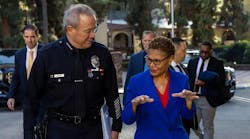The countdown to the end of Derrick Diggs' tenure as Toledo police chief has begun.
The 58-year-old Toledo native announced Thursday he will retire effective Jan. 2, citing "irreconcilable differences in policing philosophy" between himself and Mayor-elect D. Michael Collins.
The chief made a verbal announcement of his decision to Mayor Mike Bell and his staff Thursday; he plans to "pursue other professional law enforcement opportunities," according to a statement from the mayor's office. The chief was not available for interviews Thursday.
Mr. Collins said he plans on Monday to announce the next chief of police, and the rest of his cabinet.
"The individual who I will announce as police chief has already established himself as one of the most respected police officers on our department, and I am confident he will lead our department in the highest level of professionalism," the mayor-elect said.
Mr. Collins, a retired police officer and former president of the police patrolmen's union, did not elaborate on the irreconcilable differences between himself and Chief Diggs.
Other changes are coming, Mr. Collins said. "The only deputy chief retained will be Don Kenney and he will remain in charge of operations," he said.
The fate of the department's only other deputy chief, Diane Ruiz-Krause, was unclear.
Chief Diggs, the department's first black chief, was appointed to the position in 2011, succeeding Mike Navarre, who retired after 13 years as the department's highest-ranking officer.
From nearly the start of the mayoral campaign season, Mr. Collins has said he would not keep Chief Diggs in his current role. Whether the chief would retire, be fired, or be demoted was unclear until Thursday.
The Toledo Police Patrolman's Association endorsed Mr. Collins for mayor, though it "fought for the chief to stay," union President Dan Wagner said.
"We had a great working relationship with him. We've worked very well together, and working together has moved the department forward. It's improved morale and made guys work harder on the streets and I think that's reflected in the crime statistics for the first half of the year," Mr. Wagner said.
Mr. Wagner said he fielded phone calls all day from union members who were upset that Chief Diggs would not continue to lead the department. Some officers said the union never should have endorsed Mr. Collins; others wanted to know what, if anything, can be done to keep Chief Diggs in his third-floor office at the Safety Building.
Morale has improved under Chief Diggs, Mr. Wagner said. The next chief, in addition to a learning curve, also will have to work with a rank-and-file who didn't want to see Chief Diggs go.
"The next chief is going to have one heck of a hurdle," Mr. Wagner said. "There's the sentiment that you're not Derrick and we wanted Derrick."
Mr. Wagner also said a seemingly record-low number of grievances were filed under Chief Diggs' rule -- he could recall one or two.
Officers like and respect the chief, in part, because of the advances in technology, Mr. Wagner said.
Since Chief Diggs took the office in October, 2011, the changes to the department have been fairly dramatic.
Chief Diggs vowed, before his first official day as chief, to have a "bold and ambitious plan" to move the department forward.
He introduced data-driven policing, which includes regular meetings with command staff to discuss crime trends and the real-time crime center surveillance camera system. The department brought back its motorcycle unit and now has a canine unit.
More than two years ago, he also said he wanted to re-engage the city and repair a strained relationship between police and the community.
To do so, the Police Probation Team was expanded, more resources were put into the Police Athletic League, at-risk youth went on a prison visit, and five corridors were selected for special policing units that will hit the streets in 2014. The Toledo Community Initiative to Reduce Violence brought gang members into court where officials and concerned citizens told them to stop shooting.
The chief also teamed up with Lucas County Sheriff John Tharp to introduce a downtown Team Policing unit to respond to the concerns of residents and businesses.
The police department is also more visible on the Internet.
The department had profiles on Facebook and Twitter, but they were never used. In May, Chief Diggs appointed Sgt. Kevin Braun to be the department's first digital information officer, charging him with running the online accounts. Since Sergeant Braun took over, the pages have become wildly popular -- although they draw occasional criticism. They have almost 13,000 "likes" on Facebook and more than 2,000 "followers" on Twitter.
Chief Diggs' tenure was not without speed bumps, which includes a court battle with The Blade after the city refused to turn over the police departmen's map of gang territories.
The newspaper created its own map, with the help of gang members, and won a lawsuit against the city in the 6th District Court of Appeals. Though the city still refused to turn over the map, an anonymous source provided the newspaper with the department's official map.
Chief Diggs can claim an apparent drop in crime during the first six months of the year versus the same time in 2012. According to statistics from the department, property crimes were down 23 percent and violent crimes were down 19 percent.
Mayor Mike Bell, who is a close personal friend of Chief Diggs, was not available for comment. Block Watch Chairman Lon Shaver did not return a call seeking comment.
Copyright 2013 - The Blade, Toledo, Ohio
McClatchy-Tribune News Service


